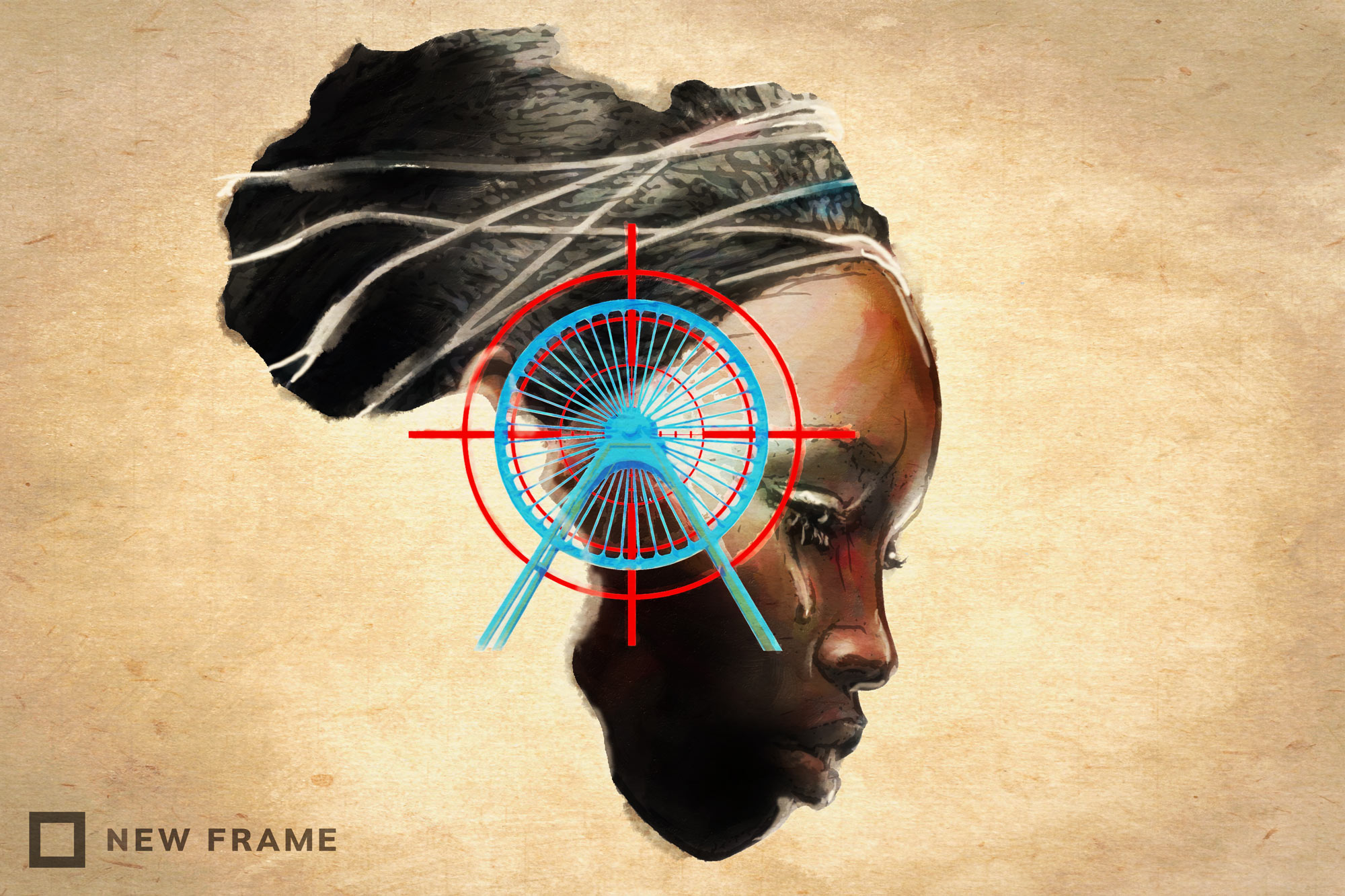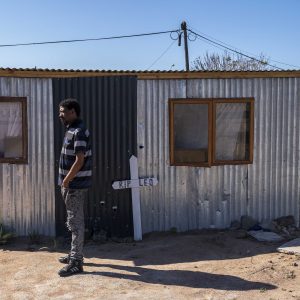The politic of blood
The repression and abandonment of impoverished people continues unabated in South Africa, consigning them to lives that cannot flourish and deaths that pass unnoticed among the elite.
Author:
30 October 2020

At around 6:30pm on Thursday 22 October, four men burst into the home that Fikile Ntshangase shared with her 11-year-old grandson in Ophondweni, near Mtubatuba in northern KwaZulu-Natal. They shot her five times, killing her.
Ntshangase was publicly opposed to the planned extension of the nearby coal mine run by Tendele Coal Mining. The mine has had a devastating effect on the natural environment and the health and livelihoods of local communities. Since 2007, it has already resulted in the removal of more than 200 families from their land as well as the graves of their ancestors. Its expansion would require the removal – forced, in some cases – of another 24 families.
Ntshangase’s opposition to the mine put her in conflict not only with the state, the Ingonyama Trust, local traditional authority and owners of the mine, but also some of the people whose livelihoods depend on it. She made powerful enemies and, in a part of the country where grassroots activists have long decried “the politic of blood”, the price for her courage was paid with her life.
Related article:
This assassination is not an anomaly. An article published on the Daily Maverick news website in September this year reported that there had been at least 38 mining-related assassinations in KwaZulu-Natal since 2006. Mining-related violence is not contained to that province. Anti-mining activist Sikhosiphi “Bazooka” Rhadebe was assassinated in Mbizana in the Eastern Cape in 2016 and the police infamously massacred 34 striking miners in Marikana in 2012.
Across the country, the shattering environmental and social consequences of mining fester in the toxic intersection of the state, ruling party, traditional authority and capital. The path to riches for some is paved with the shattered land and lives of others.
Political assassinations
But assassinations are not only consequent to the opportunities for personal enrichment that come from mining. A number of grassroots activists were assassinated in Durban between 2013 and 2018. And there have been hundreds of political assassinations in KwaZulu-Natal resulting from contestation for power in and between political parties.
Political assassinations may be concentrated in KwaZulu-Natal, but they are not confined to that province. Mpumalanga has also been wracked by assassinations, and grassroots activists, trade unionists, local politicians and state officials have been subject to assassination in many parts of the country.
Related article:
It is rare for the police to investigate the assassination of a person who is impoverished and Black seriously, and rarer still for there to be a successful prosecution. A notable exception to this was the 2016 conviction of two ANC councillors, Velile Lutsheko and Mduduzi Ngcobo, for the 2014 murder of Thuli Ndlovu, who had been the chairperson of the local branch of shack dwellers’ movement Abahlali baseMjondolo in KwaNdengezi, Durban.
It is also rare for the assassination of a person who is both impoverished and Black to make it into the news cycle. The notable exceptions to this have been enabled by sustained popular organisation or proximity to non-governmental organisation (NGO) networks.
But when a grassroots activist is not part of a well-organised popular movement and has no proximity to NGO networks, their murder is likely to pass without being investigated by the police, or noted – let alone discussed – in the elite public sphere. Under these circumstances, there is a significant degree of impunity for the use of assassinations as a form of social control.
Violence, formal and informal
Assassinations are an informal form of violence that, because they are carried out anonymously and in circumstances in which the waters can easily be muddied, lower the social and political costs of repression for powerful actors. But they need to be understood as part of a continuum of repression that encompasses the routine use of formal forms of violence, including the staggering scale at which the police murder unarmed people during street protests.
Politically targeted violence, whether carried out by izinkabi (assassins for hire), eviction squads or the police, is also part of a broader continuum of violence that functions to keep the oppressed in the spaces to which they have been assigned, and facilitate the capacity of others to accumulate wealth and power. This includes the everyday violence and humiliation meted out by a range of petty actors with uniforms and guns.
Related article:
Targeted political attacks only happen when the ordinary insults, indignities, bruises, sexual harassment, threats and theft meted out day after day are no longer able to contain dissent. And while participating in this kind of work seems to almost inevitably engender the sort of sadism that becomes an end in itself, the political function of all of this is to sustain the massive structural violence that marks our society in every respect.
That structural violence, which has always taken a toll that can, ultimately, be measured in terms of who lives and who dies, and how, is not solely consequent to the weight of the colonial past. Active dispossession and state abandonment, whether consequent to a lack of social investment or the looting of funds allocated for social investment, continue to determine whose lives flourish and whose are ruined.
Marikana and Life Esidimeni
The Marikana massacre stands as the most notorious event in the accumulation of police murders since the end of apartheid. The Life Esidimeni scandal, which resulted in the deaths of 143 people at psychiatric facilities from causes including starvation and neglect, stands as its equivalent in terms of the social cost of the misuse of the state as an instrument to pursue private profit rather than the public good.
In South Africa today, death, whether by the bullet or abandonment, is one of the mechanisms through which one class separates itself from another. Death greases the wheels of extraction and accumulation. This can only be sustained when some lives are given weight and value while others, following the foundational colonial script, are rendered fungible – unworthy of recognition and respect, and not requiring grief when squandered.
Related article:
The fabrication of race was a key tactic to expel people from the count of the human to legitimise their destruction, enslavement, domination or exploitation. But across the formerly colonised world, national elites have frequently sustained the dehumanisation of the oppressed. In Nairobi, Johannesburg, Mexico City or Mumbai, the police still conduct themselves like the armed guard of a colonial occupation.
Under these admittedly dispiriting circumstances, it’s not difficult to see why a certain pessimism about the prospects for breaking the bonds of oppression is flourishing. But it is striking that across South Africa and from Bolivia to Haiti, when roads are blockaded with burning tyres, the political language of the dispossessed often takes the form of a defiant affirmation of a common humanity.
A moment of reckoning
It is also striking that the United States has arrived at a moment of historical reckoning in which the police can no longer kill with impunity. There has also been a moment of reckoning in Nigeria. There is no reason why there can’t be a similar moment in South Africa.
Related article:
We need to ask ourselves why we in South Africa do not take to the streets when a grassroots activist is assassinated, the police gun down an unarmed person in a street protest, a sex worker is murdered in the holding cells of a police station, an incarcerated person is beaten to death in a prison or migrant detention centre, a patient starves to death in the care of the state or another child dies in the hellish panic and fear of another shack fire?
If by our quiescence we continue to accept the use of murder as a form of social control, and we continue to accept that the enrichment of some can come at the direct expense of the impoverishment and, ultimately, the death of others, we will be complicit. As Aimé Césaire, the great Martinican poet, wrote, “When the world shall be a tower of silence … we shall be the prey and the vulture.”





